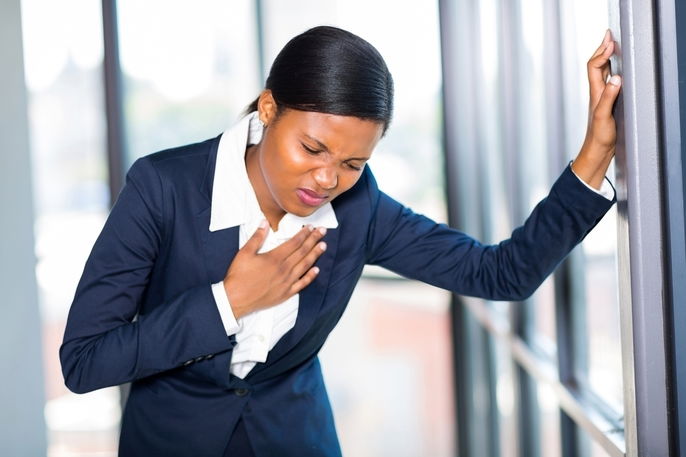To lower heart rate, you should breathe deeply for 3 to 5 minutes, cough with force 5 times or place a cold water compress on your face. These are natural methods that help to manage tachycardia.
Tachycardia is characterized by a heart rate above 100 bpm, and can be caused by stress, anxiety or consuming caffeine. A fast heart rate can also be a sign of health problems like an arrhythmia, heart failure or heart attack.
These techniques can help to lower heart rate, however, if tachycardia lasts for more than 30 minutes, is felt during sleep, or is associated with symptoms like fainting, chest pain, shortness of breath or tingling in the arm, you should call an ambulance or proceed immediately to an emergency room. These are signs of a serious health condition that requires immediate treatment.

How to lower heart rate
Some ways to normalize your heartbeat are:
- Take a deep breath, inhaling through your nose and exhaling through your mouth slowly 5 times;
- Stand up straight and bend at the hips, placing your chest on your legs;
- Place a cold compress on your face or wash your face in cold water for 20 to 30 seconds;
- Take a cold shower or drink a glass of ice water;
- Cough forcefully 5 times;
- Hold your breath and strain as if you were having a bowel movement;
- Blow air out of your mouth, releasing air slowly with your mouth half-closed 5 times;
- Count from 60 to 0, slowly and looking up;
- Perform the Valsalva maneuver by holding your breath, plugging your nose and trying to force the air out, applying pressure.
After using these techniques, symptoms of tachycardia, like tiredness, shortness of breath, general malaise, heaviness in the chest, palpitations and weakness, will begin to gradually decrease after a few minutes.
If the tachycardia lasts more than 30 minutes, or if you experience numbness on one side of the body or fainting, call an ambulance or proceed to a hospital, as these are symptoms of possible heart condition that requires immediate treatment.
Medications to lower heart rate
If you experience a fast heart rate several times in your daily routine, you should see cardiologist who may orders tests such as an ECG, echocardiogram or a 24-hour Holter. These tests assess and monitor your heart to help identify any abnormalities that contribute to a fast heart rate.
After analyzing test results, the doctor may prescribe medications to manage tachycardia, like amiodarone or flecainide. These are normally used to manage heart conditions like sinus tachycardia and, therefore, should only be taken as prescribed by a doctor.
However, some anxiolytic medications, such as alprazolam or diazepam, can also help to control tachycardia, especially when it is caused by excessive stress. Typically, these medications are prescribed by the doctor to be used when the person presents with intense symptoms of anxiety.
Home remedies
To lower a fast heart rate naturally, the doctor may recommend several lifestyle changes like avoiding caffeine and alcohol and stopping smoking.
Furthermore, it is important to maintain a healthy diet that is low in fat and sugar. Exercise also helps to release endorphins in the body, which are natural chemicals that contribute to well-being.
It is also necessary to carry out activities that reduce stress and anxiety, such as meditation.
Also recommended: 5 Stress-Related Illnesses (& How to Treat Them) tuasaude.com/en/stress-related-illnessesWhen to see a doctor
You should go to an emergency room immediately or consult a cardiologist if the fast heart rate:
- Takes more than 30 minutes to disappear
- Is accompanied by symptoms such as chest pain that radiates to the left arm, tingling, numbness, headache or shortness of breath;
- Appears more than twice a week
- Causes fainting
In these cases, a fast heart rate may be related to a more serious heart problem and requires treatment be guided by a cardiologist.






























